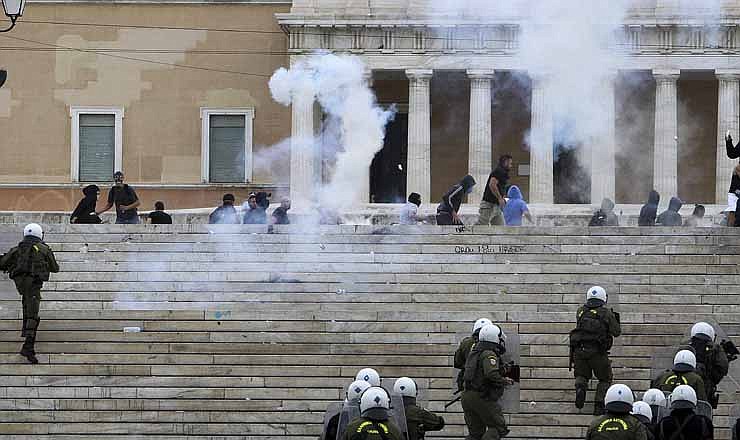ATHENS, Greece (AP) - German Chancellor Angela Merkel got a hostile reception from many ordinary Greeks Tuesday when she flew into Athens on her first visit to the country since its debt crisis erupted three years ago.
But she praised the current Greek government for covering "much of the ground" required for recovery.
"I hope and wish that Greece remains a member of the eurozone," Merkel said. "As partners, we are working hard to achieve that."
Her visit triggered protests attended by some 50,000 demonstrators in Athens. The rallies were mostly peaceful, but police briefly clashed with several dozen demonstrators and detained nearly 200 people throughout the day.
As Europe's largest contributor to the bailout fund that has rescued Greece from bankruptcy, Germany is viewed by many Greeks as the primary enforcer of the austerity measures the Greek government enacted in exchange for emergency aid.
Debt monitors from the European Union, International Monetary Fund and European Central Bank, known as the "troika", will deliver a report within coming weeks on whether Greece should receive its next bailout payment, without which it will go bankrupt.
Merkel, who stopped in Athens for five hours, said the coalition government led by Prime Minister Antonis Samaras still had to push through more key cost-cutting reforms.
"Much of the ground has been covered ... There is daily progress," Merkel said after talks with Samaras. "This is an effort that should be seen through because otherwise it would make the circumstances even more dramatic later on."
Although the German leader damped expectations in Athens of a stronger message of public support for Greece, Samaras said Merkel's visit had ended "the country's international isolation."
Greece has depended on bailouts from Europe and the International Monetary Fund since May 2010. To get the loans, it has implemented a series of deep budget cuts and tax hikes, while increasing retirement ages and facilitating private sector layoffs. To date, Greece has received €240 billion ($310 billion) in bailout loans and has renegotiated a €110 billion deal on the repayment of some of its bonds.
However, Athens must pass further austerity measures worth €13.5 billion over the next two years to qualify for its next rescue loan payment - without which the government will run out of cash next month.
Enduring austerity is set to extend Greece's recession to a sixth year in 2013 and push the rate of unemployment up to nearly 25 percent, according to government estimates.
"Greece is determined to carry out its commitment and overcome the crisis," Samaras said. "At this moment, the country is bleeding but is determined to remain in the euro ...We are not asking for more money or favors - but only a chance to stand on its feet."
Merkel's stop in Athens was welcomed by the Greek government as a much-needed boost for the country's future in Europe - but protesters viewed it as a harbinger of further austerity and hardship.
Dozens of youths broke away from the peaceful rally and threw rocks and flares at riot police, who responded with pepper spray and stun grenades, in clashes that were relatively minor.
More than 7,000 police had cordoned off parks and other sections of city to keep demonstrators away from the German leader.
As a helicopter buzzed overhead, thousands of protesters, chanting "History is written by the disobedient" gathered in front of Greek parliament. One group of demonstrators burned a Swastika and threw it onto a police barrier, while a group of special forces reservists appeared in uniform and chanted "Merkel out of Greece" in time to their march.
"I have no doubt that (Merkel) has good intentions, and wants to help, but that won't solve Europe's problem," retired teacher Irini Kourdaki said. "Europe is polarized and ... we need a major change in policy."
Merkel's visit followed a subtle shift in political rhetoric in Germany toward the Greeks, with the chancellor repeating her desire to keep Greece in the eurozone and urging political allies to refrain from public criticism of the Athens government. It appeared that a goal of the trip was to affirm her support for Samaras as Germany's best bet to see through painful structural reforms which the Germans believe are necessary if Greece is to regain economic stability.
That was a marked difference with the tone of statements made last summer, when some Merkel allies were openly dismissive of the Greeks for alleged economic mismanagement. Some politicians even suggested that Greece's departure from the common currency would not produce the economic shock that many fear.
The visit was also likely aimed at preventing the opposition Social Democrats from criticizing her for allegedly failing to display strong personal leadership in the euro crisis in the run-up to national elections expected in about a year.
Merkel told reporters in Athens that the troika report was "taking longer than was originally thought."
"But it's better to deal with problems in detail than to try and address them quickly," she said.
A senior Greek government official said rescue creditors had given the country a list of around 90 structural reforms to be approved immediately so that the vital next loan installment could be paid sometime next month.
The official asked not to be named, since talks between Merkel and Samaras were ongoing.
AP writers in Berlin and AP television and photography staff and in Athens contributed.

